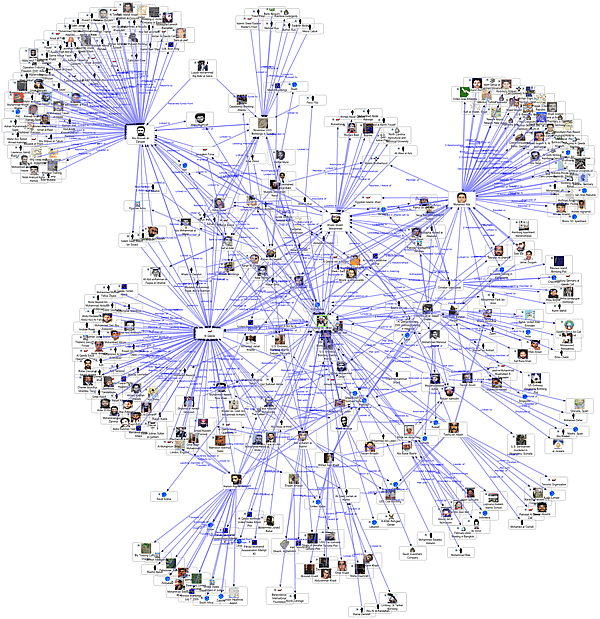When you smile at the universe, the universe smiles back
I used to think of the universe as a rational, uncaring machine. If this, then that. And given that our world, never mind our universe, is so large, I couldn’t see how we could make much of a practical difference.
But as I grow older, I’m not so sure. And that’s changed how I act throughout the day.
Our affect on other people
It’s not surprising that our actions affect other people we’re connected to. But in reading “Connected”, I was struck by the kinds of effects we have on each other. And that the effects measurably spread to people 3 degrees from me, to the friends of my friends’ friends.
“...networks influence the spread of joy, the search for sexual partners, the maintenance of health, the functioning of markets, and the struggle for democracy. Yet, social-network effects are not always positive. Depression, obesity, sexually transmitted diseases, financial panics, violence, and even suicide also spread. Social networks, it turns out, tend to magnify whatever they are seeded with.”
So, via my social network, my behavior has an impact on people I may never have met. And their behavior affects me, too.
Our affect on events
Other books, particularly those of Martha Beck, verge on the mystical in suggesting we can affect events in seemingly magical ways. She caught my attention when she referred to a book by the famous psychologist, Carl Jung. In “Synchronicity: an acausal connecting principle” he wrote at length about meaningful coincidences that can’t reasonably be explained as chance but for which there’s no other cause.
Jung, for example, tells the story of a woman relating her dream about a golden scarab when, at that very moment, there’s an insistent tapping at the window. Jung opens the window and catches a small insect as it flies inside: a golden scarabaeid beetle.
Jung offers these stories, including this charming one below, not as proof but as examples of how meaningful coincidences happen in everyday life.
“A certain M. Deschamps, when a boy in Orleans, was once given a piece of plum pudding by a M. de Fortgibu. Ten years later he discovered another plum pudding in a Paris restaurant, and asked if he could have a piece. It turned out, however, that the plum pudding was already ordered - by M. de Fortgibu. Many years afterwards, M. Deschamps was invited to partake of a plum pudding as a special rarity. While he was eating it he remarked that the only thing lacking was M. de Fortgibu. A that moment the door opened and an old, old man in the last stages of disorientation walked in: M. de Fortgibu, who had got hold of the wrong address and burst in on the party by mistake."
Jung’s contribution is asserting that in addition to space, time, and causality, there is another connecting principle at work. He’s fully aware that such a principle is dismissed by most “educated” people. And he doesn’t proclaim to know why or how these meaningful coincidences happen. But he finds a common thread in the work of sources ranging from ancient Greek and Chinese scholars to 20th-century physicists: “the world is one being, a visible God...”
Our affect on the universe
Is it possible that we’re all connected on some unconscious level? Or, more generally, that there are other connecting principles we simply don’t understand? Modern science, far from disproving that such principles exist, seem to suggest more and more of them. For example, there’s the Butterfly Effect from chaos theory:
"Small variations of the initial condition of a nonlinear dynamical system may produce large variations in the long term behavior of the system."
So even the smallest of actions (a butterfly flapping its wings in Beijing) can have dramatic and far-flung consequences (a hurricane in New York).
Odder still is something called quantum entanglement from quantum physics. It describes how two particles may be “connected” in such a way that no matter how far apart they are an action on one particle has an immediate and predictable effect on the other.
“To make an analogous experiment, a coin might be sliced along the circumference into two half-coins, in such a way that each half-coin is either “heads” or “tails”, and each half-coin put in a separate envelope and distributed respectively to Alice and to Bob, randomly. If Alice then "measures" her half-coin, by opening her envelope, for her the measurement will be unpredictable, with a 50% probability of her half-coin being "heads" or "tails", and Bob's "measurement" of his half-coin will always be opposite, hence perfectly anti-correlated.”
Wait. What? How could things and events at arbitrary distances possibly affect each other? What's the link? No wonder Einstein called it “spooky action at a distance.”
What difference will you make?
So, what difference could you make? Will you make?
What affect will it have if, say, you’re angry at other drivers or condescending to the waitress? Or if you thank someone for their work or say “good morning” to a stranger?
You don’t know.
But I take comfort in feeling that we’re more connected to people and things than we previously thought. That even our smallest actions can have a positive affect well beyond what we could imagine. That when we smile at the universe, the universe smiles back.




